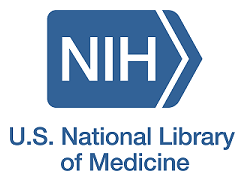

To Your Health: NLM update Transcript
Low-fat diets reconsidered: 11/14/2016

Image: Courtesy of the National Institutes of Health
Greetings from the National Library of Medicine and MedlinePlus.gov
Regards to all our listeners!
I'm Rob Logan, Ph.D., senior staff, U.S. National Library of Medicine (NLM).
Here is what's new this week in To Your Health - a consumer health oriented podcast from NLM - that helps you use MedlinePlus to follow up on weekly topics.
Low-fat diets do not result in reduced body fat or better health outcomes and should be reconsidered as a strategy for adults to lose weight, suggests a recent viewpoint published in the Journal of the American Medical Association.
In both a surprise as well as an example of the insights provided by rigorous medical research, a Harvard University obesity specialist explains recent studies strongly suggest a reduction in fat intake does not predict lowering the body fat in men or women.
David Ludwig M.D. explains recent, comprehensive studies, such as the Women's Health Initiative and Look Ahead, also suggest low-fat diets are not associated with a reduction in risk of heart disease. The author notes other research suggests men and women who carefully follow a low-fat diet experience higher, not lower, rates of premature death.
Ludwig adds (and we quote): "Recent research suggests that the focus on dietary fat reduction has directly contributed to (a) growing burden of chronic disease' (end of quote).
Ludwig explains (and we quote): 'One reason for the apparent failure of low-fat diets is that they may elicit biological adaptations — increasing hunger, slowing metabolic rate, and other hallmarks of the starvation response — that antagonize ongoing weight loss' (end of quote).
In short, Ludwig finds low-fat diets are not the pathway to foster and maintain weight loss that nutrition experts once believed. Ludwig notes the surprising findings reinforce the importance of research to initiate and change health recommendations based on research that sometimes does not reinforce conventional clinical wisdom. Ludwig writes (and we quote): 'Trial and error is inherent to the scientific process and examples abound in biomedical research of fundamentally important discoveries arising from failure' (end of quote).
Ludwig explains one of the most promising lines of current, alternative diet and health research focuses on the impact of food on the metabolism of adults and children. The author asks his colleagues for (and we quote): 'a frank accounting of past and current dietary recommendations and comprehensive measures to mitigate persistent harms from the low-fat diet era' (end of quote).
Meanwhile, a guide to help you select a healthy diet (from the Mayo Foundation for Research and Education) is available within the 'start here' section of MedlinePlus.gov's diets health topic page. The American Heart Association provides information about the Mediterranean Diet within the 'specifics' section of MedlinePlus.gov's diets health topic page.
The Academy of Nutrition and Dietetics suggests how to stop the cravings many dieters experience within the 'related issues' section of MedlinePlus.gov's diets health topic page.
MedlinePlus.gov's diets health topic page also provides links to the latest pertinent journal research articles, which are available in the 'journal articles' section. Links to relevant clinical trials that may be occurring in your area are available within the 'clinical trials' section. You can sign up to receive updates about diets as they become available on MedlinePlus.gov.
To find MedlinePlus.gov's diets health topic page, please type 'diets' in the search box on MedlinePlus.gov's home page, then, click on 'diets (National Library of Medicine).' MedlinePlus.gov also has health topic pages devoted to specific diets, such as vegetarian, as well as health topic pages devoted to nutrition for adults, children, and seniors.
Before I go, this reminder... MedlinePlus.gov is authoritative. It's free. We do not accept advertising .... and it is written to help you.
To find MedlinePlus.gov, just type 'MedlinePlus.gov' in any web browser, such as Firefox, Safari, Chrome, or Explorer, on any platform.
We encourage you to use MedlinePlus and please recommend it to your friends. MedlinePlus is available in English and Spanish. Some medical information is available in 48 other languages.
Your comments about this or any of our podcasts are always welcome.
Please email the podcast staff anytime at: NLMDirector@nlm.nih.gov
A written transcript of recent podcasts is available by typing 'To your health' in the search box on MedlinePlus.gov's home page.
The National Library of Medicine is one of 27 institutes and centers within the National Institutes of Health. The National Institutes of Health is part of the U.S. Department of Health and Human Services.
A disclaimer — the information presented in this program should not replace the medical advice of your physician. You should not use this information to diagnose or treat any disease without first consulting with your physician or other health care provider.
It was nice to be with you. Please join us here next week and here's to your health!





















.png)












No hay comentarios:
Publicar un comentario